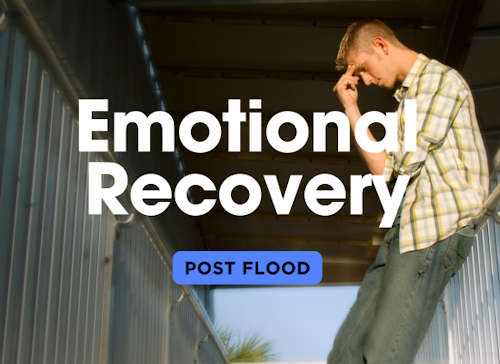Floods can be devastating, both physically and emotionally. The psychological toll can linger long after the waters recede. Here are 12 ways to cope with the emotional impacts, starting with the first four in-depth strategies.
1. Acknowledge Your Emotions 🌊
Floods can trigger a mix of emotions such as fear, grief, and frustration. It’s important to recognize and validate your feelings rather than pushing them away.
- Action: Write down your emotions in a journal or speak with someone you trust.
- Why it helps: Processing emotions openly reduces internal stress, making it easier to work through trauma.
- Time commitment: Just 10-15 minutes a day to reflect on how you’re feeling can be immensely helpful.
2. Create a Support Network 🤝
After a flood, isolation can worsen emotional distress. Surround yourself with supportive people—family, friends, or even local recovery groups.
- Action: Join community meetings or online support groups for flood survivors.
- Why it helps: Sharing experiences with others going through the same situation reduces the sense of being overwhelmed.
- Key benefit: You’ll find strength in numbers and learn coping mechanisms that others have found effective.
3. Practice Mindfulness and Relaxation 🧘♂️
Mindfulness exercises such as deep breathing and meditation can help regulate overwhelming emotions and anxiety that come from dealing with a flood.
- Action: Set aside 10 minutes a day for deep breathing exercises or guided meditations.
- Why it helps: These practices reduce stress hormones in the body and help keep you grounded in the present moment.
- Tip: You can use apps like Headspace or Calm for guided meditations.
4. Set Small, Manageable Goals 🎯
Dealing with the aftermath of a flood can feel insurmountable. Break down tasks into smaller, manageable goals to avoid feeling overwhelmed.
- Action: List out tasks that need to be completed, like cleaning or paperwork, and tackle them one at a time.
- Why it helps: Achieving small wins can boost your mood and give you a sense of control during chaotic times.
- Bonus Tip: Celebrate even small progress to keep motivation high.
5. Stay Physically Active 🏃♀️
Physical activity helps release endorphins, which are natural mood lifters. Even though a flood may limit your regular routine, finding ways to stay active can greatly benefit your mental health.
- Action: Take short walks, do simple home exercises, or join a virtual fitness class.
- Why it helps: Exercise reduces symptoms of depression and anxiety, while also giving you a break from stress.
- Key benefit: It helps you sleep better, which is crucial for emotional recovery after trauma.
6. Limit News and Social Media Exposure 📵
Constant updates on the flood or its aftermath can lead to heightened anxiety. While it’s important to stay informed, too much exposure can be emotionally draining.
- Action: Schedule specific times to check the news or social media, and limit your time to no more than 30 minutes.
- Why it helps: This keeps you informed without overwhelming you with stressful information.
- Pro Tip: Use apps that limit screen time or block certain apps during hours you need to focus on recovery.
7. Seek Professional Help 💬
Sometimes the emotional toll of a flood is more than we can manage on our own. Seeking help from a therapist or counselor can provide you with tools to cope effectively.
- Action: Reach out to a mental health professional, whether in person or through telehealth services.
- Why it helps: Professional guidance can help you work through trauma, grief, or anxiety more efficiently.
- Extra resource: Many areas have crisis lines or disaster response mental health services that offer free or low-cost counseling.
8. Focus on What You Can Control 🔧
In the face of a flood, many things are beyond your control, which can lead to a sense of helplessness. Shifting focus to what you can control helps regain emotional stability.
- Action: Create a list of things you can influence, like organizing personal belongings or helping others in your community.
- Why it helps: Focusing on controllable aspects reduces anxiety and helps you feel empowered.
- Bonus Tip: Taking small, actionable steps each day will also give you a sense of accomplishment and purpose.
9. Maintain a Routine 🕒
Floods can disrupt daily life, but maintaining a regular routine helps provide a sense of normalcy and stability in the midst of chaos.
- Action: Establish a daily schedule, even if it’s just for simple tasks like meals, self-care, or bedtime.
- Why it helps: Having a structure reduces stress and provides something familiar to hold onto.
- Pro Tip: Try to include at least one positive or enjoyable activity in your routine to lift your spirits.
10. Volunteer or Help Others 👐
Helping others who are also affected by the flood can foster a sense of community and purpose, reducing feelings of helplessness or isolation.
- Action: Volunteer at local shelters, offer to help neighbors clean up, or donate supplies to recovery efforts.
- Why it helps: Acts of kindness can improve your own mood and provide a sense of accomplishment.
- Bonus Tip: You don’t have to commit to long hours—even small efforts can make a difference and help you feel connected.
11. Celebrate Small Victories 🎉
In the aftermath of a flood, progress can be slow and overwhelming. Celebrating small achievements can keep morale high and prevent burnout.
- Action: Recognize and celebrate each small win, whether it’s clearing a room or completing a stressful task.
- Why it helps: Acknowledging progress, no matter how minor, reinforces a positive outlook and keeps you motivated.
- Pro Tip: Keep a list of achievements to look back on when you’re feeling discouraged.
12. Accept That Healing Takes Time ⏳
Emotional recovery after a flood doesn’t happen overnight. Allow yourself time to grieve, adjust, and heal at your own pace without rushing the process.
- Action: Be patient with yourself, and avoid comparing your recovery to others.
- Why it helps: Understanding that healing is a gradual process allows you to go easier on yourself and reduce pressure.
- Key benefit: You’ll likely find more peace and emotional resilience as you adapt over time.
Support References
FEMA (Federal Emergency Management Agency) – Disaster Survivor Assistance
- URL: https://www.fema.gov/disaster-survivor-assistance
- Description: FEMA provides direct assistance to disaster survivors, including emotional support and access to mental health services, financial aid, and housing assistance.
American Red Cross – Coping with Disaster
- URL: https://www.redcross.org/get-help/disaster-relief-and-recovery-services/recovering-emotionally.html
- Description: The American Red Cross offers resources and information to help people recover emotionally after a disaster, including floods. They provide tips on managing stress and handling the emotional challenges of recovery.
SAMHSA (Substance Abuse and Mental Health Services Administration) – Disaster Distress Helpline
- URL: https://www.samhsa.gov/find-help/disaster-distress-helpline
- Description: SAMHSA’s helpline offers free 24/7 crisis counseling for people experiencing emotional distress related to natural disasters like floods.
CDC (Centers for Disease Control and Prevention) – Coping with a Disaster or Traumatic Event
- URL: https://emergency.cdc.gov/coping/selfcare.asp
- Description: The CDC provides helpful information on dealing with emotional distress caused by disasters, offering guidance on self-care, stress management, and when to seek help.
National Child Traumatic Stress Network – Flood Resources
- URL: https://www.nctsn.org/what-is-child-trauma/trauma-types/natural-disasters/floods
- Description: NCTSN offers resources for families and children affected by floods, focusing on coping strategies for trauma and emotional recovery.
Mental Health America – Coping with Natural Disasters
- URL: https://www.mhanational.org/coping-natural-disasters
- Description: Mental Health America provides tips on coping with the emotional aftermath of natural disasters, including floods. They offer resources for managing trauma, stress, and anxiety.
Ready.gov – Recovering from a Disaster
- URL: https://www.ready.gov/recovering-disaster
- Description: Ready.gov provides guidance on how to emotionally and physically recover from disasters, including information on federal disaster assistance programs and coping strategies for emotional distress.
Disaster Assistance Improvement Program (DAIP)
- URL: https://www.disasterassistance.gov/
- Description: DAIP helps disaster survivors apply for disaster assistance, including mental health support, housing, and financial resources to help them rebuild their lives after a flood or other natural disaster.
National Institute of Mental Health (NIMH) – Coping with Traumatic Events
- URL: https://www.nimh.nih.gov/health/topics/coping-with-traumatic-events
- Description: NIMH provides expert information on coping with traumatic events, including natural disasters. They offer resources on recognizing emotional distress and when to seek professional help.
International Federation of Red Cross and Red Crescent Societies – Psychological Support after a Flood
- URL: https://www.ifrc.org/psychological-support-after-floods
- Description: The IFRC offers psychological support services to people affected by floods, including practical advice on emotional recovery and coping strategies to deal with trauma.



